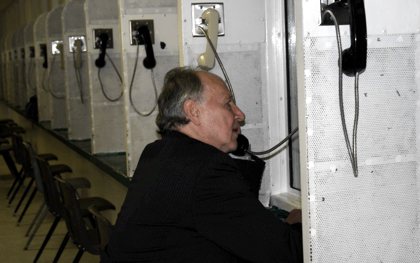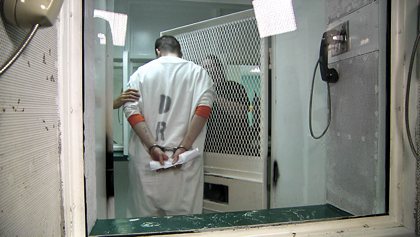Festivals
Berlinale 2012: The S&S blog
The grim Werner: Herzog does Death Row

Death Row
Jonathan Romney, 10 February
The prospect couldn’t be bleaker – you arrive in Berlin on a frosty February evening, dash to pick up your accreditation, then spend your first night in town watching a three-hour Werner Herzog documentary about American prisoners condemned to death. I’d already been cracking the expected jokes about what a Herzog doc called Death Row might hold – and then, sure enough, it’s not long before those sepulchral Bavarian tones are asking a convict, “How do you feel about your impending fate?” Herzog certainly couldn’t be accused of excessive diplomacy, even to a man who’s looking his own death in the face: he even starts one interview by telling a convicted murderer that just because he’s interested in his case, “It does not necessarily mean I have to like you.”
A four-part TV project for Channel 4, Death Row is a pretty substantial prospect, and a different undertaking from Into the Abyss, Herzog’s documentary on the same theme, to be released in the UK next month. This one deals with four different cases – presented as four ‘portraits’ of five different prisoners, although in fact the film oscillates unevenly between character profiles and what you’d have to classify as ‘true crime’ case histories, bolstered with testimonies from family members, detectives, attorneys et al.
The four films, running approximately 45 minutes each, are at their most riveting when Herzog restrains his usual interviewing eccentricities (which he pretty much does) and allows his subjects to tell their stories. One man, Floridan killer and arsonist James Barnes, is at once the film’s most unsettling and most familiar figure – a calm, lucid, shaven-headed man, and you have to blink to remind yourself that he’s not being played by Pruitt Taylor Vince. It’s the testimony of his sister Jeannice, herself with a chequered criminal past, that offers one of the most disturbing insights, with intimations of a shared nightmare past and possibly repressed memories of sexual abuse.

We never quite know how much to believe of what the prisoners tell us; with little else to do while awaiting death, it would seem only normal that some degree of fabulation would keep people sane. An ebullient Texan named Hank Skinner – something of a natural comic – protests his innocence, and tells an extraordinary story about a last-minute reprieve from lethal injection, just when he’d already started tucking into his final meal (a more than copious blow-out that could only be Texan). And a British woman named Linda Carty is the focus of a truly distressing horror story about the kidnapping and murder of a Mexican woman: Carty, a mercurial performer first seen giving a flamboyant performance of ‘Amazing Grace’, is the most elusive, unknowable figure here. For sheer narrative power, though, there’s no beating the charismatic George Rivas, a jailbreak maestro whose adventures you wouldn’t credit if Herzog decided to spin them into a fiction feature (and I wouldn’t be at all surprised if he did); as recounted here by Rivas and fellow condemned man Joseph Garcia, they’re riveting.
I haven’t seen Into the Abyss yet, so I couldn’t say how the films compare in offering a picture of life in extremis, or in what they reveal about the death sentence in general (Herzog announces flatly at the start that he’s against it, but doesn’t belabour the point). Death Row is certainly never less than compelling in what it shows of American life at its most brutally disadvantaged – while the way that successive life sentences have cascaded down on Rivas’s head says a lot about the more flamboyant absurdities of American law.
But Herzog’s interviewing process doesn’t entirely emerge with flying colours: much of the time, he seems to be making it up as he goes along, asks some outrageously leading questions, and can be flippant or even tabloid-y – asking one felon how he felt about a dead police officer’s son “waiting for Daddy to come home.” Herzog is never seen, but the camera holds on his interviewees, who for the most part are unflappable, dignified, candid (as far as we can tell) and, in one case, even versed in their interviewer’s own history. “You know that movie Werner Herzog Eats His Shoe?” says Skinner. “Well, that’s what the food is like here.”
« Introduction: I am just going outside…
Distribute this! Watching and workshopping »
See also
Out of the darkness: Werner Herzog talks to Samuel Wigley about Cave of Forgotten Dreams (April 2011)
Venice Film Festival: Jonathan Romney sees Herzog’s new Bad Lieutenant: Port of Call New Orleans and My Son, My Son, What Have Ye Done? (September 2009)
Capote reviewed by Tim Robey (March 2006)
Invincible reviewed by Richard Falcon (April 2002)
The Green Mile reviewed by Rob White (March 2000)
True Crime reviewed by John Wrathall (June 1999)
